In September of 1991, Bob Bates of Legend Entertainment flew to Florida for a meeting of the Software Publishers Association. One evening there after a long day on the job, still dressed in his business suit, he took a walk along the beach, enjoying a gorgeous sunset as he anticipated a relaxing dinner with his wife and infant son, who had joined him on the trip.
Yet his mind wasn’t quite as peaceful as was the scenery around him. He was in fact wrestling with a tension which everybody who does creative work for a living must face at some point: the tension between what the artist wants to create and what the audience wants to buy. Bob had made Timequest, his first game after co-founding Legend, as a self-conscious experiment, meant to determine whether a complicated, intricate, serious, difficult parser-driven adventure game was still a commercially viable proposition in 1991. The answer was, as Bob puts it today, “kind of”: Timequest hadn’t flopped utterly, but it hadn’t sold in notably big numbers either. Steve Meretzky’s decidedly lower-brow games Spellcasting 101 and 201, which had bookended Timequest on Legend’s release schedule, had both done considerably better. Bob had already started making notes for a Timequest II by the time the first one shipped, but he soon had to face the reality that the sales numbers just weren’t there to support more iterations on the concept.
Now, in the midst of his walk on the beach, a name sprang unbidden into his head: “Eric the Unready.” Such a gift from God — or from his subconscious — had never come to him before in that manner, and never would again. But no matter; once in a lifetime ought to be enough for anyone. He found the name hilarious, and chuckled to himself over it the rest of the way to the restaurant. At last, he knew what his next game would be: a straight-up farce about a really, really unready knight named Eric. With that decision made, he was ready to enjoy his evening.
The more he thought about the idea upon returning to daily life inside Legend’s Virginia offices, the more he realized that it had more going for it in practical terms than most rarefied bolts from the blue can boast. Indeed, it was an idea about which no marketer could possibly have complained, being well-nigh precision-targeted to hit the industry’s commercial sweet spot as accurately as any Legend title could hope to. If the success of Legend’s Spellcasting games hadn’t sufficiently proved to the company how potent a combination comedy and fantasy could be, there was plenty of other evidence on offer. Adventure gamers loved comedy, which was just as well given that it was the default setting the form always wanted to collapse back into, a gravitational attraction that could be defied by a designer only through serious, single-minded effort; these realities explained why Sierra made so many comedies, and why LucasArts’s adventure catalog contained very little else. And gamers in general just couldn’t get enough fantasy; this explained the quantity of dungeon-crawling CRPGs clogging store shelves, not to mention the success of Sierra’s King’s Quest adventure series. To complete the formula for sales gold, Bob soon decided that Eric the Unready would also toss aside all of Timequest‘s puzzle complexity to jump onto what Legend saw as another emerging industry trend: that of making adventure games friendlier, more accessible to the non-hardcore. In short, Bob’s latest game would be easy.
So, Eric the Unready was to be an unabashed bid for mainstream success, as safe a play as Legend knew how to make at this juncture. But such a practical commercial profile isn’t necessarily an artistic kiss of death; like all of the best of such efforts, Eric the Unready is executed with such panache that even a jaded old critic like me just can’t help but love it in spite of his snobbishness.
Inveterate student of history that he is, Bob’s first impulse upon starting any project is always to head to the library. In fact, one might say that his research for Eric the Unready began long before he even thought to make the game. The name itself actually has an historical antecedent, one which was doubtless bouncing around somewhere in the back of Bob’s mind when he had his brainstorm: Æthelred the Unready is the name of an English king from shortly before the Norman Conquest. The epithet had always amused Bob inordinately. (For the record: the word “unready” in this context means something closer to poorly advised than personally incompetent. Nevertheless, it was the latter, anachronistic meaning which Bob was about to embrace with glee.)
After the project began in earnest, Bob’s research instinct meant lots of reading of contemporary fantasy, a genre he had heretofore known little about. More out of a sense of duty than enthusiasm, he worked through Margaret Weis and Tracey Hickman’s Dragonlance and Death Gate novels, Michael Moorcock’s Elric saga, and even Stephen R. Donaldson’s terminally turgid Chronicles of Thomas Covenant the Unbeliever.
In the end, none of it would prove to have been necessary — and this was all for the best. Eric the Unready has little beyond its “fantasy” label in common with such po-faced epics. The milieu of the finished game is vaguely Arthurian, as you might expect of a game written by the Anglophile creator of Arthur: The Quest for Excalibur. This time out, though, Bob tempered his interest in Arthurian myth with a willingness to toss setting and even plot coherence overboard at any time in the name of a good joke. As such, the game inevitably brings to mind a certain Monty Python movie — and, indeed, there is much of that beloved British comedy troupe in the game. Other strong influences which Bob himself names include Douglas Adams, Terry Pratchett, and, hitting closer to home, Steve Meretzky.
The humor of Eric the Unready might best be summarized as “maximalism with economy.” Bob:
My [plots] were always meant to be scrupulously well-designed,. There was never a logical inconsistency. All of them were solidly constructed. But with Eric the Unready, I consciously said, “If I see the opportunity for a joke that doesn’t quite make sense, I’m going to do it anyway.” Toward the end of the project, I wondered how many jokes there were in Eric. I can remember counting that there were over a thousand of them. It’s just crammed full of funny material: in the newspapers, hidden in the conversations, hidden all over the place.
The economy comes in, however, with Eric the Unready‘s determination never to beat any single joke into the ground — something that even Steve Meretzky was prone to do in too much of his post-Infocom work. As Graham Nelson and others have pointed out, one of Infocom’s secret weapons was, paradoxical though it may sound, the very limitations of their Z-Machine. The sharply limited quantity of text it allowed, combined with the editorial oversight of Jon Palace, Infocom’s unsung hero, kept their writers from rambling on and on. But text had become cheap on the computers of the 1990s, and thus Legend’s software technology, unlike Infocom’s, allowed the author an effectively unlimited number of words — a dangerous thing for any writer. A Legend author was under no compulsion whatsoever to edit himself.
Luckily, Bob Bates’s dedication to doing the research came through for him here, in a way that ultimately proved far more valuable than his study of fantasy fiction. He had been interested in the mechanics and theory of comedy long before starting on the game, and now reread what some of the past masters of the form — people like Milton Berle and Johnny Carson — had to say about it. He recalled an old anecdote from the latter, which he paraphrases as, “Not everybody is going to like every joke. But if you can get 60 percent of the people to laugh at 60 percent of your jokes, you’re a success.” One of the funniest writers ever once noted in the same spirit that “brevity is the soul of wit.” Combining these two ideals, Bob’s approach to the humor in Eric the Unready became not to stress over or belabor anything. He would crack a joke, then be done with it and move on to the next one; rinse and repeat, rinse and repeat. “There’s always another bus coming,” says Bob by way of summing up his comedy philosophy. “If you don’t get this one, don’t worry; you’ll get the next one.”
At this point, then, I’d like to share some of Eric the Unready‘s greatest comedic hits with you. One of the pleasures for me in revisiting this game a quarter-century on has been remembering all of the contemporary pop culture it references, pays homage to, or (more commonly) skewers. Thus many of the screenshots you see below are of that sort — wonderful for remembering the somehow more innocent media landscape of the United States during the immediate post-Cold War era, that window of peace and prosperity before history caught up with us again on September 11, 2001. (Why does the past always strike us as more innocent? Is it because we know what will come after, and familiarity breeds quaintness?)
But another of my agendas is to commemorate Legend’s talented freelance art team, whose work was consistently much better than we had any right to expect from such a small studio. Being a writer myself, I have a tendency to emphasize writing and design while giving short shrift to the visual aesthetics of game-making. So, let me remedy that for today at least. The quality of the artwork below is largely thanks to Tanya Isaacson and Paul Mock, Legend’s two most important artists, who placed their stamp prominently on everything that came out of the company during this period.
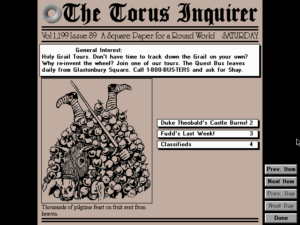
Each chapter includes a copy of the newspaper for that day. Together, they provide a running commentary on Eric’s misadventures of the previous chapters — and lots of opportunities for more jokes. Shay Addams, the publisher of the Questbusters newsletter and book series and a ubiquitous magazine commentator and reviewer, rivaled Computer Gaming World‘s Scorpia for the title of most prominent of all the American adventure-game superfans who parleyed their hobbies into paychecks. (Scorpia as well showed up in games from time to time — perhaps most notably, as a poisonous monster in New World Computing’s Might and Magic III, her comeuppance for a negative review of Might and Magic II.) Alas, Addams disappeared without a trace about a year after Eric the Unready was published. Rumor had it that he took up a career as a professional gambler (!) instead.
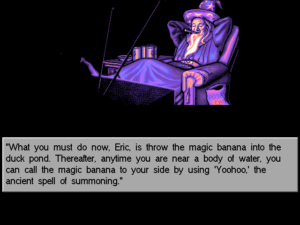
A really old-school shout-out, to Scott Adams, the first person to put a text adventure on a microcomputer. “Yoho” was a magic word in his second and most popular game of all, Pirate Adventure.
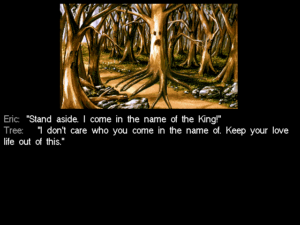
The computer-game industry of the early 1990s still had some of the flavor of pre-Hays Code Hollywood. Even as parents and politicians were fretting endlessly over what Super Mario Bros. was doing to Generation Nintendo, computer games remained off their radar entirely. That would soon change, however, bringing with it the industry’s first attempts at content rating and self-censorship.
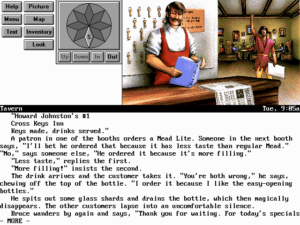
The “tastes great, less filling” commercials for Miller Lite were an inescapable presence on American television for almost two decades, placing athletes and B-list celebrities in ever more elaborate beer-drinking scenarios which always concluded with the same tagline. They still serve as a classic case study in marketing for the way they convinced stereotypically manly, sports-loving male beer drinkers that it was okay to drink a (gasp!) light beer.
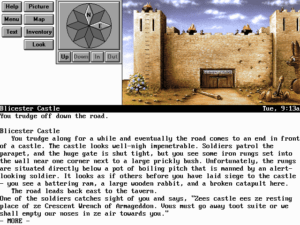
We couldn’t possibly skip an explicit homage to Monty Python and the Holy Grail, could we?

Wheel of Fortune — and the bizarre French obsession with Jerry Lewis.

David Letterman’s top-ten lists were a pop-culture institution for almost 35 years. Note the presence on this one of Vice President Dan Quayle, who once said that Mars had air and canals filled with water, and once lost a spelling bee to a twelve-year-old by misspelling “potato.”
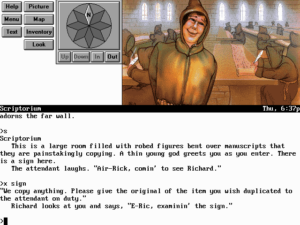
Rob Schneider’s copy-machine guy was one of the more annoying Saturday Night Live characters to become an icon of his age…
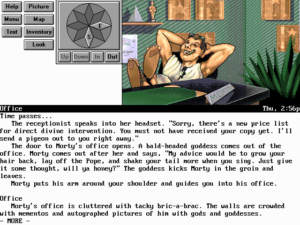
Speaking of Saturday Night Live: in one of the strangest moments in the history of the show, the Irish singer Sinead O’Connor belted out a well-intentioned but ham-fisted a-capella scold against human-rights abuse in lieu of one of her radio hits. At the end of the song, she tore up a picture of the pope as a statement against the epidemic of child molestation and abuse in the Catholic Church.
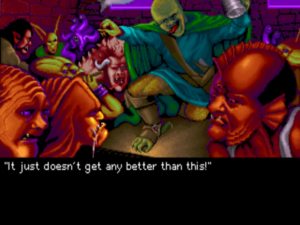
Some of Miller Lite’s competition in terms of iconic beer commercials for manly men came in the form of Old Milwaukee and its “It just doesn’t get any better than this” tagline. (Full disclosure: Old Milwaukee was my dad’s brew of choice, I think mostly because it was just about the cheapest beer you could buy. I have memories of watching John Wayne movies on his knee, coveting the occasional sip of it I was vouchsafed.)

Madonna was at her most transgressive during this period: she had just released an album entitled Erotica and a coffee-table book of softcore porn entitled simply Sex. Looked back on today, her desperate need to shock seems more silly than threatening, but people reacted at the time as if the world was ending. (I should know; I was working at a record store when the album came out. Ah, well… even as an indie-rock snob, I had to recognize that her version of “Fever” slays.) Meanwhile the picture that accompanies the newspaper article above pays tribute to another pop diva: Grace Jones.
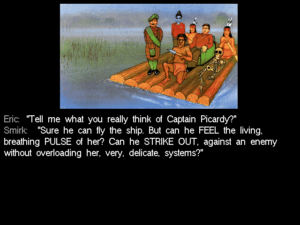
My favorite chapter has you exploring a “galaxy” of yet more pop-culture detritus with the unforgettable Captain Smirk, described as “250 pounds of captain stuffed into a 175-pound-captain’s shirt.” (This joke might just be my favorite in the whole game…)
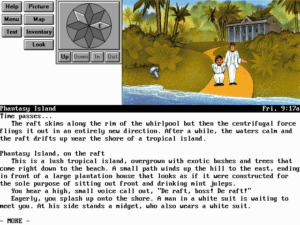
Fantasy Island, in which a new collection of recognizable faces was gathered together each week to live out their deepest desires and learn some life lessons in the process, was one of the biggest television shows of the pop-culture era just before Eric the Unready, when such aspirational lifestyle fare set in exotic locations — see also Fantasy Island‘s more family-friendly sibling The Love Boat — was all the rage. It all really does feel oddly quaint and innocent today, doesn’t it?

Eric the Unready manages to combine all three of actor and decadent lifestyle icon Ricardo Montalbán’s most recognizable personas in one: as Mr. Roarke of Fantasy Island, as Khan of Star Trek II: The Wrath of Khan, and as a pitchman for Chrysler.
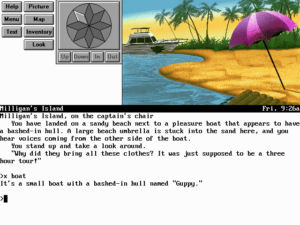
And at last we come to Gilligan’s Island, a place within a three-hour sailing tour of civilization which has nevertheless remained uncharted — the perfect scene for a sitcom as breathtakingly stupid as its backstory.
Eric the Unready is the first Legend game to fully embrace the LucasArts design methodology of no player deaths and no dead ends. Even if you deliberately try to throw away or destroy essential objects out of curiosity or sheer perversity, the game simply won’t let you; the object in question is always restored to you, often by means that are quite amusing in themselves. Just as in a LucasArts comedy, the sense of freedom this complete absence of danger provides often serves the game well, empowering you to try all sorts of crazy and funny things without having to worry that doing so will mean a trip back to your collection of save files. Unlike many LucasArts games, though, Eric the Unready doesn’t even try all that hard to find ways of presenting truly intriguing puzzles that work within its set of player guardrails. In fact, if there’s a problem with Eric the Unready, it must be that the game offers so little challenge; Bob Bates’s determination to make it the polar opposite of Timequest in this respect carried all the way through the project.
The game is really eight discrete mini-games. At the start of each of these “chapters,” Eric is dumped into a new, self-contained environment that exists independently of what came before or what will come later. By limiting the combinatorial-explosion factor, this structure makes both the designer’s and the player’s job much easier. Even within a chapter, however, there are precious few head-scratching moments. You’re told what you need to do quite explicitly, and then you proceed to do it in an equally straightforward manner — and that’s pretty much all there is to solving the game. Bob long considered it to be the easiest game by far he had ever designed. (He was, he noted wryly when I spoke to him recently, forced by popular demand to make his recent text adventure Thaumistry even easier, which serves as something of a commentary on the ways in which player expectations have changed over the past quarter-century.)
All that said, it should also be noted that Eric the Unready‘s disinterest in challenging its player was more of a problem at the time of its original release than it is today. Whatever their other justifications, difficult puzzles served as a way of gumming up the works for the player back in the day, keeping her from burning through a game’s content too quickly at a time when the average game’s price tag in relation to its raw quantity of content was vastly higher than today. Without challenging puzzles, a player could easily finish a game like Eric the Unready in less than five hours, in spite of its having several times the amount of text of the average Infocom game (not to mention the addition of graphics, music, and sound effects). At a retail price of $35 or $40, this was a real issue. Today, when the game sells as a digital download for a small fraction of that price, it’s much less of one. Modern distribution choices, one might say, have finally allowed Eric the Unready to be exactly the experience it wants to be without apologies.
Certainly Bob has fantastically good memories of making this game; he still calls it the most purely enjoyable creative endeavor of his life. Those positive vibes positively ooze out of the finished product. Yet there was a shadow lurking behind all of Bob’s joy, lending it perhaps an extra note of piquancy. For he knew fairly early in Eric the Unready‘s development cycle that this would be the last game of this type he would get to design for the foreseeable future. Legend, you see, was on the verge of dumping the parser at last.
They had fought the good fight far longer than any of their peers. By the time Eric the Unready shipped in January of 1993, Legend had been the only remaining maker of parser-based adventure games for the mainstream, boxed American market for over two years. As part of their process of bargaining with marketplace realities, they had done everything they could think of to accommodate the huge number of gamers who regarded the likes of an Infocom game much as the average contemporary movie-goer regarded a Charlie Chaplin film. In a bid to broaden their customers demographic beyond the Infocom diehards, Legend from the start had added an admittedly clunky method of building sentences by mousing through long menus of verbs, nouns, and prepositions, along with copious multimedia gilding around the core text-adventure experience.
As budgets increased and the market grew still more demanding, Legend came to lean ever more heavily on both the mouse and their multimedia bells and whistles. By the time they got to Eric the Unready, their games were already starting to feel as much point-and-click as not, as the regular text-and-parser window got superseded for long stretches of time by animated cut scenes, by full-screen static illustrations, by mouseable onscreen documents, by mouse-driven visual puzzles. Even when the parser interface was on display, you could now choose to click on the onscreen illustrations of the scenes themselves instead of the words representing the things in them if you so chose.
Still, it was obvious that even an intermittent recourse to the parser just wouldn’t be tenable for much longer. In this new era of consumer computing, a command line had become for many or most computer users that inscrutable, existentially terrifying thing you got dumped into when something broke down in your Windows. The last place these people wanted to see such a thing was inside one of their games. And so the next step — that of dumping the parser entirely — was as logical as it was inevitable.
Eric the Unready wouldn’t quite be the absolute last of its breed — Legend’s Gateway 2: Homeworld would ship a few months after it — but it was the very last of Bob’s children of the type. Once Eric the Unready and Gateway 2 shipped, an era in gaming history came to an end. The movement that had begun when Scott Adams shipped the first copies of Adventureland on hand-dubbed cassette tapes for the Radio Shack TRS-80 in 1978 had run its course. Yes, there was a world of difference between Adams’s 16 K efforts with their two-word parsers and pidgin English and the tens of megabytes of multimedia splendor of an Eric the Unready or a Gateway 2, but they were all nevertheless members of the same basic gaming taxonomy. Now, though, no more games like them would ever appear again on the shelves of everyday software stores.
And make no mistake: something important — precious? — got lost when Legend finally dumped the parser entirely. Bob felt the loss as keenly as anyone; through all of his years in games which would follow, he would never entirely stop regretting it. Bob:
What you’re losing [in a point-and-click interface] is the sense of infinite possibility. There may still be a sense that there’s lots you can do, and you can still have puzzles and non-obvious interactions, but you’ve lost the ability to type anything you want. And it was a terrible thing to lose — but that’s the way the world was going.
I found the transition personally painful. That’s evidenced by the fact that I went back and wrote another parser-based game more than twenty years later. A large part of the joy of making this type of game for me is the sense that I’m the little guy in the box. It’s me and the player. The player senses my presence and feels like we’re engaged in this activity together. There’s a back-and-forthing — communication — between the two of us. It’s obviously all done on my part ahead of time, but the player should feel like there’s somebody behind the curtain, that it’s a live exchange. It should feel like somebody is responding as an individual to the player.
As Bob says, point-and-click games are … not necessarily worse, but definitely different. The personal connection with the designer is lost.
A long time ago now in what feels like another life, I entitled the first lengthy piece I ever wrote about interactive fiction “Let’s Tell a Story Together.” At its best, playing a text adventure really can feel like spending time one-on-one with a witty narrator, raconteur, and intellectual sparring partner. I would even go so far as to admit that text adventures have cured me of loneliness once or twice in my life. There’s nothing else in games comparable to this experience; only a great book might possibly compare, but even it lacks the secret sauce of interactivity. Indeed, text adventures may be the only truly literary form of computer game. Just as a book is the most personal, intimate form of traditional artistic expression, so is a text adventure its equivalent in interactive terms.
Granted, some of those qualities may initially be obscured in Eric the Unready by all the flash surrounding the command prompt. But embrace the universe of possibilities that are still offered up by that blinking cursor, sitting there asking you to try absolutely anything you wish to, and you’ll find that the spirit which changed the lives of so many of us when we encountered our first Infocom game lives on even here. Don’t just rush through the fairly trivial task of solving this game; try stuff, just to see what the little man behind the curtain says back. Trust me when I say that he’s very good company. One can only hope that all of those who bought Eric the Unready in 1993 appreciated him while he was still around.
(My huge thanks go to Bob Bates for setting aside yet another few hours to talk about the life and times of Legend circa 1992 to 1993.
Eric the Unready can be purchased on GOG.com. It’s well worth the money.)

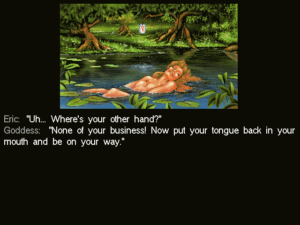










Rowan Lipkovits
December 6, 2019 at 5:11 pm
“Madonna was at her most transgressive during this period”
Also perhaps worth noting in that caption; the illustration in that newspaper is repeating an iconic pose by Grace Jones on the cover of her 1985 album Island Life.
Jimmy Maher
December 6, 2019 at 7:59 pm
Good catch. Thanks!
Lisa H.
December 6, 2019 at 5:51 pm
I thought huh, Aethelred’s epithet is a bit funny given that his name includes the element -rede, advice or counsel, so I looked him up. According to Wikipedia the pun was intentional
Lisa H.
December 6, 2019 at 5:52 pm
Oops, missed the closing period there.
drphish
December 6, 2019 at 8:13 pm
The infinite feeling of the text parser has just been revived! Check out this research project in the form of a kind of interactive collaborative storytelling AI:
http://www.aidungeon.io/
It needs lots of horsepower, and runs on google’s cloud GPU service in your web browser (for free once you log in to a google account)
I have been absolutely blown away by this thing, and I can imagine a renaissance brought about by these techniques combined with a custom trained and seeded AI model (and a LOT more polish)
Brian Bagnall
December 22, 2019 at 4:26 pm
Thanks for the link, I hadn’t heard of this one before. It’s interesting to try out cutting edge tech that might evolve into something useful someday. For now it generates a pretty nonsensical story. I played a detective mystery and there was a man standing behind me in a forest who took a shot at me. After some talk he walked up to me and I grabbed his gun, talked a bit more, then shot him. I then examined his body and he was made of wood apparently. He also kept talking after he was dead and told me his name was James Bond. Either this is a surreal nightmare adventure or there is a lot of work to be done.
Wouter Lammers
December 6, 2019 at 8:52 pm
Will definitely give this one a try!
vastly high than today -> vastly higher than today?
Jimmy Maher
December 6, 2019 at 9:00 pm
Thanks!
Martin
December 7, 2019 at 12:45 am
So what is the number one favorite prank of the gods?
Lisa H.
December 7, 2019 at 1:00 am
…David Letterman’s haircut? which it says at the bottom of the screenshot?
Martin
December 7, 2019 at 1:37 am
Duh! For some reason I didn’t see that.
Roberto
December 7, 2019 at 1:07 am
I actually don’t think this game is much easier than, say, Meretzky’s Planetfall (I actually solved that one in less time than this one, but obviously this is a subjective thing). But (maybe even more than the other Legend games I played, namely Gateway I and II) it really feels “sandboxed”. Every chapter is closed in itself, the typical Infocom interlocking puzzles spread out over the game’s geography are definitely gone here. The other “problem” I see in this game is the “baseball” probem, or whatever Graham Nelson named it, not about puzzles, but the humour. I think I missed half of the jokes just because I’m not american (at least as I can tell from this article, in which I discovered jokes I simply couldn’t taste not knowing american pop culture at that specific time). Maybe that’s also a reason why I found it more difficult than it should be (while still easy), I’m not sure. Despite all of this, I still reccomend this game as a funny fantasy rope (and there’s also poking on adventure tropes, see the Underworld part). There’s even an hint for a sequel in the ending, but that didn’t happen.
Menneisyys
December 7, 2019 at 5:14 pm
“I think I missed half of the jokes just because I’m not american (at least as I can tell from this article, in which I discovered jokes I simply couldn’t taste not knowing american pop culture at that specific time)”
Yup, the same problem here. I (European) have played thru the game in Summer 1993 but “got” only very few of the jokes / references (Terry Pratchett, Monty Pyhton etc. but definitely not for example Madonna).
BTW, I’m still loving this game. I’ve recently started to re-playing it, along with TimeQuest. (The latter I couldn’t finish in 1991 – I may have been too young for its immense complexity. Now I’m far more ahead without any help or walkthrus.) I even own all Legend games, some even in two versions (TimeQuest in 1.0 and 1.1.)
menneisyys
December 7, 2019 at 5:18 pm
“I found it more difficult than it should be (while still easy)”
For me, back in 1993, w/o any walkthrus, the largest time I ended up spending was on the “sacrifice” scene – I spend hours on trying to find out what I should do.
Other puzzles were quite easy (and immensely easier than those of TimeQuest and still easier than Spellcasting 101/201, particularly with the Lost Souls chapter of the former, which is plain impossible to complete for a non-English native speaker) – probably as easy as those of Gateway 1.
Tsubasanut
December 25, 2019 at 10:58 am
I second this. Played Eric somewhere in 1996. Despite being Russian and pretty bad at English at that time, I just loved the game, still in my top 10 P&C adventures. I haven’t watched Star trek, nor Monthy Python, and missed a lot of references. And still the game has such reaching across the cultures humor! I’m still cracking up just remembering this door with ten doorbells. Thanks for bringing this up, got to replay it ASAP.
Iffy Bonzoolie
July 13, 2020 at 7:11 pm
I definitely found it much easier than Planetfall, but, I guess the context matters.
I played Planetfall when I was quite young (younger than 10). I had to ask my mom what a “crag” and a “cleft” in a cliff was. It took me a long time, over many sessions, and I used InvisiClues to figure out the last couple puzzles.
With Eric the Unready, I took it home and played it through in one session. I was in high school by that time, and I enjoyed it thoroughly, but I noted it as being exceptionally easy.
It seems like making a hard (by being unfair) text adventure is easy, and making an easy one requires at least a concerted effort…
Lisa H.
July 13, 2020 at 10:57 pm
I tried to play Zork 1 when I was about 6-7. I didn’t know what it meant for a window to be “ajar” and spent a while trying to open a nonexistent jar.
Vince
August 24, 2023 at 11:41 am
Yeah, not being American I probably got 30% of the pop culture references.
Also, as someone that in general does not find this kind of humor particularly funny and coupled with the lack of challenge, Eric sits definitely in the bottom half of my list of favorite Legend games.
Lane
December 7, 2019 at 1:53 am
One of the few games I ever returned for a refund. Not because it was bad, per se. But I bought the CD-ROM version – which was not enhanced in *any* way over the floppy version.
Jacen aka Jaina
December 7, 2019 at 3:29 am
“should know; I was working on a record store”
Clicking on the first picture got me the text ” was perhaps the most prominent and long-lived of all the American adventure-game superfans whp”
Jimmy Maher
December 7, 2019 at 6:54 am
Thanks!
Chris Lang
December 7, 2019 at 4:50 am
Ah, Eric the Unready. It’s a fun game, with fun parodies of everything from Renaissance faires to Star Trek. Its only real weakness (that I can think of offhand) is the dated cultural references (such as the Sinhead O’Connor reference, and the jokes aimed at Bill Clinton, George HW Bush, and Ross Perot) that kind of ‘date’ the game.
There ARE a few ways to die in this game, but they’re easily undone with an ‘UNDO’ command. But the ‘instant death’ from nowhere thing is mostly averted. And at one point, the game even hilariously subverts your expectations that doing a certain thing will lead to your demise. It’s been a while, but if I recall correctly, you pass through a spiked turnstile before entering the Zork/adventure parody area. If you look at the turnstile, you’re advised against touching it. Attempting to touch it results in a hilarious response from the parser, as it goes out of its way to avoid killing you for doing so.
And yes, the text parser gives us a sort of connection with an adventure game unlike any other. It’s fun typing in all sorts of inputs just to see if you’ll encounter some witty response or some Easter egg. And yes, I agree completely that it’s a more intimate experience, a ‘Let’s Tell a Story Together’ type thing, than any other interface.
Peter Olausson
December 7, 2019 at 2:05 pm
Worth mentioning: The great cover is original art by fantasy master Boris Vallejo.
Kerry Guerrero
December 7, 2019 at 9:46 pm
In caption for next to last image: Ricardo Montalbán rather than Ricardo Monelban
Jimmy Maher
December 9, 2019 at 12:54 pm
Thanks!
Fuck David Cage
December 7, 2019 at 11:13 pm
I love this game: The hilarious humor, great characters, nice variety of settings and witty death scenes made it a classic. No matter what you and Ron Gilbert say, I say that clever death scenes add tension and excitement to an adventure–no one would read Lord of the Rings or War and Peace if the characters were always safe! That is part of the reason why I prefer Sierra, Access and Legend to Lucasarts games–the lack of tension and danger make it the black sheep of my favorite adventure game companies and lessen the excitement of its games.
Bluddy
December 15, 2019 at 11:02 pm
I generally agree, though I think LucasArts games are superior in many other ways as well. They tend to be better made and designed, aside from this point. I think there’s a distinction though — I don’t mind saving in a dangerous situation. Having the loss of work as a threat is akin to the threat of having to redo a section in an action game, and the remedy is a save system or checkpointing. Note that more serious LucasArts games, such as Indiana Jones and Full Throttle have dangerous parts for this reason.
The real problem is when tiny, meaningless objects you missed can no longer be accessed, causing a dead man walking situation. Avoiding this problem requires heavy investment into a meta-game of save indexing, and is completely inappropriate IMO. This comes about purely due to bad design, and unfortunately, as is well documented in this blog, Sierra were the kings of bad design.
Fuck David Cage
December 7, 2019 at 11:20 pm
I agree with Scorpia about Might and Magic: It really is a dull, repetitive, unimaginative series with a lot of bad decisions like having enemies age the characters constantly and putting the fountain of youth at the end. Give me Zelda and Metroid for dungeon crawling R.P.G.s and Superhero League of Hoboken and Xenoblade for open world R.P.G.s.
GeoX
December 13, 2019 at 1:47 am
Having beaten, oh, every Might and Magic game, I can honestly say that I never had any trouble whatsoever with the aging mechanic. Sure, it was pointless (though amusing in the early games to use magic to give your characters negative ages), but really, that’s a weird thing to be hung up on.
Gerry Quinn
January 31, 2020 at 11:04 pm
She was writing about MM2, and for me that game was a huge breath of fresh air after the relatively turgid and humourless Bards Tale.
M&M games had their flaws, but at the end of the day they were always a good old-fashioned monster bash with great freedom of movement.
(Not to mention spawning what was my favourite strategy game ever, Heroes of Might and Magic III.)
Fuck David Cage
December 7, 2019 at 11:27 pm
Fun fact: Dictionary.com says “potatoe” was considered an acceptable spelling until the reaction to Dan Quayle showed that the everyone had forgotten about it. Dan Quayle was still retarded.
Ross
December 8, 2019 at 12:01 am
It’s not like Quayle made up that spelling. It was what was on the card they gave him. I mean, would you have overruled the official answer given to you? Is a special celebrity emcee at a spelling bee supposed to have the authority to override the official printed answer sheet?
Carlton Little
December 8, 2019 at 8:20 pm
But he knew better than that. You’re telling me you’d have done the same, in his shoes?
Tom
March 4, 2021 at 3:51 am
I wouldn’t unilaterally override what the card said – he was most likely coming in blind and may have assumed that “potatoe” was the accepted regional spelling , or it was specific to this contest – who knows? People get real picky about that sort of thing – one of the biggest fights I ever got into with a supervisor was over the spelling of grey/gray. (He was a micromanaging asshole, but I digress)
In retrospect he probably should have asked one of the facilitators, but who could have known such a triviality would be the defining event in his political career?
Mike
December 8, 2019 at 8:31 pm
“pre-Hayes Code Hollywood”
“Hays Code”, after Will H. Hays.
Jimmy Maher
December 9, 2019 at 12:52 pm
Thanks!
Bluddy
December 15, 2019 at 11:07 pm
I must admit that even though I grew up adjacent to the period of text adventures’ popularity, they never appealed to me. I played Hitchhiker’s Guide, for example, and though I liked it, it doesn’t remain vivid in my memory. Only with the combination of parser and images, as in Sierra’s AGI and early SCI games, did I find the combination that worked for me. So even though I respect these games, I don’t particularly like any of them. I would, however, love to see some company return to that space of parser/2d/3d space combinations — even if it might mean doing away with prerecorded voice work.